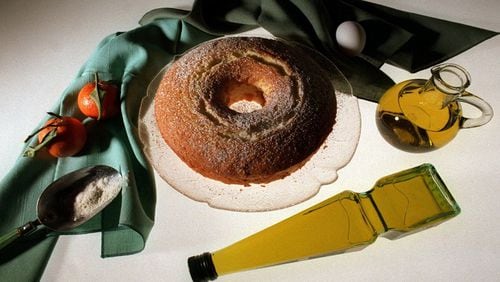Want to avoid gaining a few extra pounds this holiday season? Be mindful of what you're bringing to a party and what you're eating. This time of year offers almost daily temptation to add extra calories as parties become numerous along with platters of rich and delicious seasonal foods.
The Academy of Nutrition and Dietetics offers a few tips to keep from added pounds. If you are hosting a gathering this holiday season and want to lighten up your offerings without sacrificing taste, try swapping out a few ingredients in your favorite recipes.
--Using two egg whites in place of one egg can reduce dietary cholesterol and produce the same tasty result.
--Try low-sodium vegetable broth in your mashed potatoes to add flavor and cut back on added butter or margarine.
--Substitute applesauce for oil, margarine or butter in muffins and quick breads such as banana bread. Try substituting a small amount at first, as the more you substitute the more the texture of the finished product changes.
--For dips, sauces and pie toppings, use fat-free yogurt, sour cream and whipped topping.
--Sliced almonds make a delicious, crunchy topping in place of fried onion rings.
--Choose reduced-fat or low-fat cheeses for salads and casseroles.
Pack your shopping cart with plenty of fresh vegetables including sweet potatoes, winter squash, broccoli, carrots and green beans. Apples, cranberries and pears combine easily for a tasty salad, fruit crisp or topping for the turkey.
If you are a guest at a dinner party or other gathering, consider these tips to keep your night healthy, happy and safe:
--Start your day with a small meal that includes whole grains, fruit, vegetables and protein.
--Don't starve yourself beforehand. Rather, eat a small meal or snack so you aren't tempted to overeat.
--Don't rush to eat. Socialize and settle into the festivities before you eat.
--Savor foods you truly enjoy and pass up on those that don't really interest you.
--Move your socializing away from the buffet or appetizer trays. This will minimize the unconscious nibbling.
When it comes to drinking alcohol, satisfy your thirst before having an alcoholic drink by starting with water. Moderate alcohol consumption is defined as up to one drink per day for women and up to two drinks for men. Keep in mind, even a single drink will affect your reflexes for several hours. If you plan to drink, keep your holidays merry for everyone by designating a driver who won't be drinking.
The holidays are a great time for gathering with friends and family over food and drinks. With just a little preparation, you can enjoy celebratory foods mindfully and still experience all that the season has to offer -- without gaining an extra pound
Q and A
Q: Are artificial food dyes dangerous?
A: Companies add food dyes to products to make them look tasty and appealing to consumers. Although some synthetic food dyes have been banned from use in the U.S., nine remain on the FDA's approved list. The FDA states that color additives are safe when they are used in accordance with FDA regulations. However, synthetic dyes do not provide any nutritional benefits, and preliminary research has linked them with potential risks related to cancer, birth defects, allergic reactions, and problems in children, including hyperactivity, learning impairment, irritability and aggressiveness. Additional research is needed to confirm the side effects of food dyes. Due to health concerns surrounding artificial dyes, and an increased customer desire for "natural" foods without synthetic ingredients, many companies have started using natural colors obtained from plants and spices. Examples include beta-carotene, paprika, beet juice, algae and turmeric. Although these may be better options and are generally considered safe, natural dyes also may cause allergic reactions in certain individuals. It is important to remember that replacing artificial colors with natural ones doesn't necessarily make the food a healthier choice. Often foods containing dyes tend to be heavily processed, and high in fat, sugar and sodium. -- Environmental Nutrition Letter.






